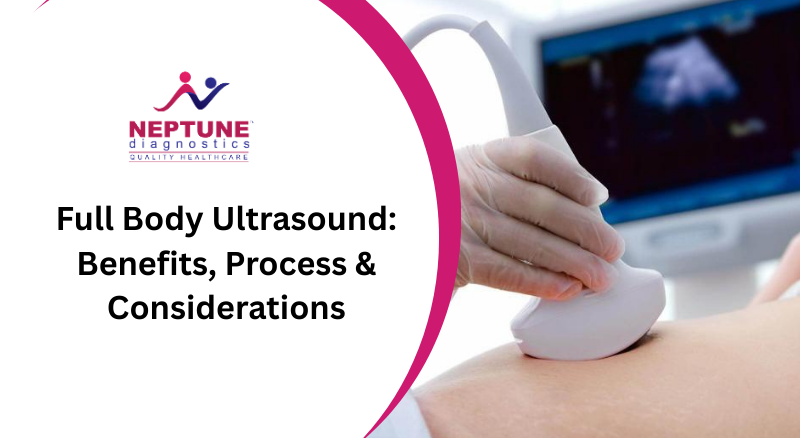Modern healthcare is no longer about treating illness only when it appears—it is about prevention, early detection, and personalized care. One of the most valuable diagnostic tools that makes this possible is the ultrasound scan. While most people associate ultrasound with pregnancy, today it is widely used for scanning multiple organs and systems in the body. A full body ultrasound offers a non-invasive, safe, and efficient way to assess overall health, detect hidden issues, and guide further treatment if required.
This article explores the benefits, process, and key considerations of a full body ultrasound so patients and families can make well-informed decisions about their health.
What Is a Full Body Ultrasound?
A full body ultrasound is a diagnostic imaging test that uses high-frequency sound waves to create real-time images of internal organs, tissues, and blood flow. Unlike X-rays or CT scans, ultrasound does not use radiation, making it safe for people of all ages.
During a full body ultrasound, major organs such as the liver, kidneys, pancreas, gallbladder, spleen, bladder, thyroid, and reproductive organs are examined. In some cases, blood vessels, muscles, and joints may also be evaluated.
Benefits of a Full Body Ultrasound
1. Early Detection of Health Issues
Ultrasound can reveal conditions like gallstones, kidney stones, fatty liver, cysts, tumors, or blockages at an early stage—often before symptoms appear.
2. Non-Invasive and Radiation-Free
Unlike other imaging methods, ultrasound is completely non-invasive and safe, making it suitable for repeated use, even in children and pregnant women.
3. Real-Time Imaging
It provides instant visuals, helping doctors assess organ function, blood flow, and abnormalities quickly.
4. Pain-Free and Comfortable
The procedure involves no injections, needles, or discomfort, and usually takes less than an hour.
5. Preventive Health Check
A full body ultrasound is a great option for people undergoing annual health check-ups, especially those with family history of chronic illnesses.
When Should You Consider a Full Body Ultrasound?
Doctors may recommend a full body ultrasound in the following cases:
- Routine health check-up for prevention.
- Unexplained abdominal pain or bloating.
- Persistent fatigue without clear reasons.
- Family history of liver disease, kidney issues, or tumors.
- Monitoring chronic conditions like fatty liver or gallstones.
- Pre-surgical evaluation to rule out hidden concerns.
The Full Body Ultrasound Process
Step 1: Preparation
- Patients may be advised to fast for 6–8 hours before the scan, as food can interfere with imaging of abdominal organs.
- Loose, comfortable clothing is recommended.
- In some cases, patients may need to drink water before the scan to ensure the bladder is full for better imaging.
Step 2: The Scan
- The patient lies down on the examination table.
- A water-based gel is applied to the skin to allow smooth movement of the transducer (ultrasound probe).
- The transducer emits sound waves that bounce back to create images of internal organs.
- The radiologist examines multiple areas, capturing images as needed.
Step 3: Post-Scan
- Once the scan is complete, the gel is wiped off.
- There are no restrictions—patients can resume normal activities immediately.
- A detailed report is prepared by the radiologist, often available the same day.
Considerations Before a Full Body Ultrasound
1. Not a Replacement for All Tests
While ultrasound is extremely useful, it cannot detect all conditions. For example, very small tumors or deep tissue issues may require MRI or CT scans.
2. Patient Factors
In some cases, obesity or excessive gas in the abdomen can reduce image clarity.
3. Dependence on Skill
The accuracy of results depends on the radiologist’s expertise and the quality of the equipment.
4. Frequency of Use
Doctors may not recommend full body ultrasound very frequently unless there are specific medical concerns. It is best used as part of an annual or periodic health check-up.
Who Should Get a Full Body Ultrasound?
- Adults above 30 for preventive screening.
- Individuals with lifestyle risks such as smoking, alcohol consumption, or sedentary habits.
- Patients with unexplained or recurring health issues.
- People with family history of chronic organ diseases.
- Health-conscious individuals looking for comprehensive screening.
Full Body Ultrasound at Neptune Diagnostics Center
At Neptune Diagnostics Center, patients receive advanced ultrasound services performed using state-of-the-art imaging technology. The center emphasizes accuracy, comfort, and patient safety, ensuring every scan is handled by skilled radiologists and trained technicians. Whether it’s for preventive health check-ups or to diagnose specific conditions, Neptune Diagnostics Center provides trusted and reliable diagnostic solutions, helping patients make informed decisions about their health.
FAQs About Full Body Ultrasound
Q1. How long does a full body ultrasound take?
Usually 30–60 minutes, depending on the number of organs being scanned.
Q2. Is fasting always required before a full body ultrasound?
Yes, in most cases fasting is recommended for clear abdominal imaging, but it may vary based on the doctor’s advice.
Q3. Can pregnant women undergo a full body ultrasound?
Yes, it is safe for pregnant women since ultrasound uses no radiation.
Q4. How often should I get a full body ultrasound?
Once every 1–2 years for preventive screening, or more frequently if advised by your doctor.
Q5. Is a full body ultrasound painful?
No, it is a completely painless and non-invasive procedure.

